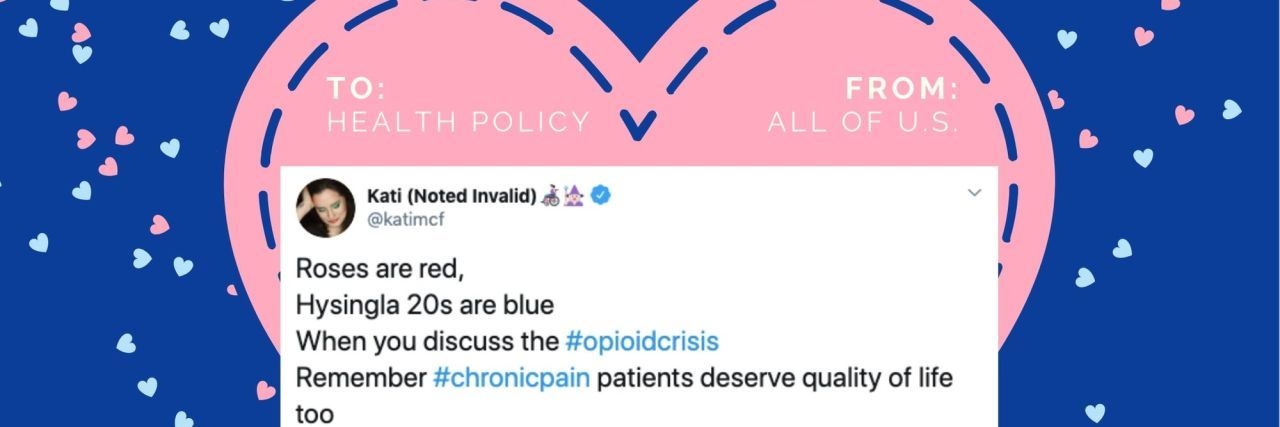Annual #HealthPolicyValentines Twitter Hashtag Roasts Health Care Policy for Valentine's Day
Health policy may not always be sexy — and it’s certainly complicated — but there’s a good reason to make it part of your Valentine’s Day tradition thanks to a viral Twitter hashtag.
In an annual trend initially started by health policy expert Emma Sandoe, Twitter users are again sharing their best #HealthPolicyValentines this year. Written in the tradition of the timeless poem, “Roses are red, violets are blue,” people are formulating their best love notes to U.S. health care policy, from drug pricing smackdowns to chronic illness advocacy, sharing helpful health tips and raising awareness.
How lucky are we to have the queen bee. The originator of #HealthPolicyValentines @emma_sandoe is on team @ncdhhs with me!
— Mandy Cohen (@SecMandyCohen) February 13, 2020
Ahead of November’s presidential election where health care reform will take center stage, this viral hashtag highlights some of the key issues to keep in mind, while serving up a little humor along the way. Plus, just like memes, these humorous poems will make you laugh at the ridiculousness of a difficult health care system, which may be a nice reprieve, especially if you live with a chronic illness, disability or mental health condition.
So this Valentine’s Day, cozy up to someone you love and prepare to chortle (or rage) at all the love letters these clever Twitter users composed about health care (or lack thereof) in the United States.
Here’s what people shared:
Roses are red,
Hysingla 20s are blue
When you discuss the #opioidcrisis
Remember #chronicpain patients deserve quality of life too#HealthPolicyValentines— Kati (Noted Invalid)????????????????????♀️ (@katimcf) February 13, 2020
Roses are red
Band-Aids are brown
They can cost $629
In one Connecticut town#HealthPolicyValentines https://t.co/2CuYWH1S9H— Sarah Kliff (@sarahkliff) February 12, 2020
Roses are red
Violets are blue
Trump & GOP want to cut Medicaid
And Medicare too.#HealthPolicyValentines— Laura Packard @ ???? (@lpackard) February 12, 2020
My love for you has no annual or lifetime limits.#HealthPolicyValentines
— Elena Hung ???? is @ ???? (@ElenaHung202) February 13, 2020
I know you're so tired
of this ancient riff
but my love, we must end
the #SubsidyCliff#HealthPolicyValentines— Charles Gaba (@charles_gaba) February 13, 2020
On #HealthPolicyValentines Day, we should also consider those who like being single…
For example, a single payer health system.— Dr Tim says please stay at home (@timsenior) February 13, 2020
Roses are red
I like being healthy
Make healthcare affordable
Not just for the wealthy#HealthPolicyValentines— The Health Collaborative (@hcollaborative) February 13, 2020
Roses are red
Purple the iris
Stigma's much more deadly
Than the bloody coronavirus#HealthPolicyValentines #COVID19— Amy Coopes (@coopesdetat) February 13, 2020
#journalhumor #healthpolicyvalentines pic.twitter.com/TK3ozRyGq8
— Health Affairs (@Health_Affairs) February 13, 2020
Is it #HealthPolicyValentines season again?! pic.twitter.com/kELKni78Nl
— MA Health & Hospital Association (@MAHealthHosp) February 12, 2020
Roses are red,
Violets are blue,
When health plans deny mental health care,
They make my heart hurt too.#HealthPolicyValentines— NAMI Advocacy (@NAMIAdvocacy) February 13, 2020
Roses are red,
Violets are blue.
I don't love my private health insurance,
What about you?#HealthPolicyValentines— Elizabeth O'Brien (@elizobrien) February 12, 2020
Roses are red,
and violets are portable
Out-of-pocket health costs
are completely unaffordable.#HealthPolicyValentines— Richard (RJ) Eskow (@rjeskow) February 13, 2020
Couldn't help #HealthPolicyValentines -ing my latest:
Roses are red
Violets are blue
Sometimes your insurer pre-authorizes something
But the bill is still left to youhttps://t.co/isqH3WfNr5— Lauren Weber (@LaurenWeberHP) February 12, 2020
Roses are red
Health disparities aren’t small
We have to talk about race
If we want good health for all#HealthPolicyValentines #RaceMatters https://t.co/kB9dI3WMfI— CT Health Foundation (@CTHealth) February 13, 2020
Roses are red, violets are blue, mental health matters, just like physical health too #HealthPolicyValentines
— Lindsey Boylan (@LindseyBoylan) February 13, 2020
Roses are red
Violets are blue
The #ACA should be expanded on
To make health care affordable for me and you.#HealthPolicyValentines— Third Way Economic (@ThirdWayEcon) February 13, 2020
Roses are red. Violets are blue. If you don’t support health reform, one day you’ll be screwed, too. #HealthPolicyValentines
— Jeneen Interlandi (@JInterlandi) February 13, 2020
Drug prices are nonsense
Violets are blue
Insulin was first used to treat diabetes
In 1922 #HealthPolicyValentines— Lauren F. Friedman (@fedira) February 13, 2020
Roses are red,
In Canada it's free
So we won't lose our house
When we get a disease…#HealthPolicyValentine #HealthPolicyValentines— Futurist Jim Carroll (@jimcarroll) February 13, 2020
Roses are red ????
Diamonds are bright ????
Pulling new moms off Medicaid ????????
Just isn’t right ????#HealthPolicyValentines #marchformoms— neel_shah (@neel_shah) February 13, 2020
????Oh yeah, I'll tell you something
I think you'll understand
When I'll say that something
You’ve got to wash your hands!#fluseason #healthpolicyvalentines— AcademyHealth (@AcademyHealth) February 13, 2020
Roses are red
I’m feeling blue
Block granting #Medicaid
Is bad through and through!Roses are red
Violets are blue
Dismantling Medicaid
Hurts me and you#HealthPolicyValentines— ACAP (@safetynetplans) February 13, 2020
Some states are red
Some states are blue
Solving the benefits cliff
I hope we’d ALL like to do #HealthPolicyValentines— Jennifer Sullivan MD MPH (@confectionsmd) February 12, 2020
Want to get serious about health care? Check out these Mighty articles for more:
- Disability Takes Center Stage at Latest Town Hall. Here’s What You Might Have Missed.
- A Guide to Following the Health Debate in the 2020 Elections
- What Medicare for All Could Mean for Chronic Illness, Disability and Mental Health
- How the 2020 Candidates Have (and Have Not) Included People With Disabilities
Article updated Feb. 17, 2020.

